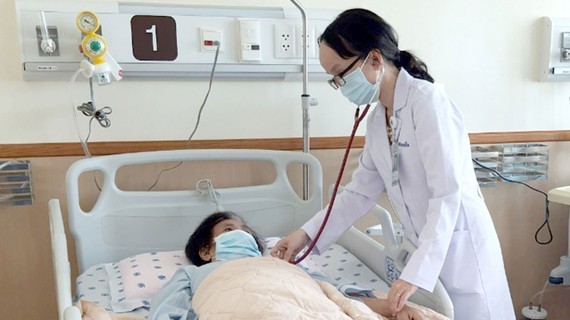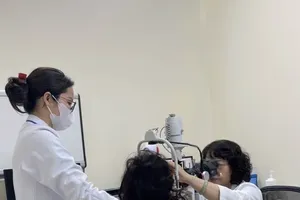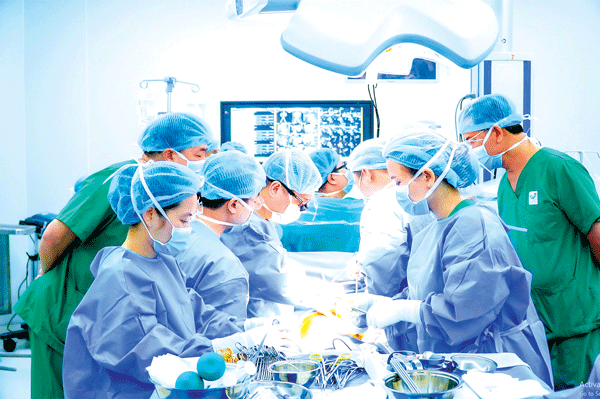 Illustrative photo
Illustrative photo
While many developed countries still use first-generation antibiotics, Vietnam has to use third- and fourth-generation antibiotics. Not only that, many studies show that bacteria in Vietnam are resistant to many antibiotic types.
Every time her daughter has a cough, fever, and runny nose, Ms. Tran Thanh Ngoc in Ho Chi Minh City’s District 8 runs to the pharmacy near her house to buy treatment drugs, including antibiotics for self-medication because she thought it is not necessary to see a doctor. Elsewhere in the city, Mr. Le Minh Binh in Thu Duc City has bought medicine for his younger son based on his eldest son’s old prescription when the youngest son had similar symptoms. Mr. Binh explained that children have symptoms of fever, cough, runny nose, and respiratory infections, so even if children are taken to see a doctor, doctors will prescribe similar drugs.
According to Dr. Nguyen Tran Nam, Deputy Director of the City Children's Hospital, reusing old prescriptions is a common and dangerous habit of many parents. Parents who take their children to see a doctor are given a prescription to take medicine to cure their children’s illnesses; later, if children have the same symptoms, parents will use the previous prescription to buy medicine.
Additionally, after their children take drugs for 2-3 days, many parents often stop giving medicine to their children when they realized their children’s symptoms improved, or parents took their children to other doctors if their children’s illness didn’t abate. Parents don't even know that their children are taking antibiotics, only thinking that those drugs have a curative effect.
According to medical experts, a person’s body has an amazing internal defense mechanism called the immune system which protects them from bacteria and viruses that can lead to illness and remember to help identify faster, stronger, better response when that agent invades next time. When antibiotics are used indiscriminately, the role of the immune system has been removed. If there are germs or bacteria that invade, use antibiotics, antibiotics will kill them, while the body's immune system has not yet recognized them. So the next time a germ or bacteria attacks, the immune system has not yet memorized it to fight back. Over time, the body will depend on antibiotics, losing the ability to fend for itself. Overuse of antibiotics is to have abandoned effective weapons against germs and bacteria, making treatment and cure increasingly difficult.
At the Conference on Antibiotic Resistance - Opportunities and Challenges recently organized by the Ministry of Health, Dr. Cao Hung Thai, Deputy Director of the Department of Medical Examination and Treatment Administration, said that the level of drug resistance in Vietnam is increasing more and more putting great pressure on the community’s health. In addition to the financial burden of prolonged treatment, patients also face the possibility that no antibiotics are effective for them to treat some infections, especially for surgical and surgical procedures such as cancer chemotherapy and tissue transplantation.
Wide-spread overuse and misuse of antibiotics have led to unintended consequences. Antibiotic resistance is a worldwide threat due to the misuse of antibiotics, the spread and transmission of resistance, infection or environmental pollution. Healthcare workers in Vietnam are facing widespread levels of bacteria resistant to many antibiotics, especially in third and fourth generation cephalosporins, aminosides and fluoroquinolones.
According to Assoc. Prof-Dr. Pham Thi Ngoc Thao, Deputy Director of Cho Ray Hospital, in 2021, the hospital recorded the 5 most multi-resistant bacteria including A.baumannii, E.coli, S.aureus, K.pneumoniae and P. aeruginosa. This is the top threat to patients as multidrug-resistant bacteria are becoming a silent pandemic taking place globally. Without appropriate interventions, patients will face the risk of mass death without an effective cure.
In particular, during the Covid-19 pandemic, in addition to treating severe cases of infection or co-infection or superinfection, medical experts have noted the occurrence of gram-negative bacteria types which caused more deaths. Many patients were recovering from Covid-19 but later died due to healthcare-associated infections. Multidrug-resistant bacterial infections have caused many patients not to die from Covid-19 but from infection. All the resistant bacteria in the world have appeared. Multidrug-resistant bacteria will disable the effectiveness of antibiotics, which is the direct cause of death for many patients, said Associate Professor Pham Thi Ngoc Thao.
Similarly, a study conducted at the Military Medical Hospital 175 under the Ministry of Defense during the Covid-19 pandemic showed that antibiotic resistance in Covid-19 patients was very high. Amongst them, the rate of Acinetobacter bacteria resistant to Carbapenem antibiotic group was 60 percent and only 82 percent sensitive to Colistin, and 54 percent to Minocycline. In addition, the rate of multi-resistant bacteria accounted for 33 percent, extended resistance accounted for 52 percent, and full resistance was 15 percent in Covid-19 patients who had been treated at this infirmary.
























